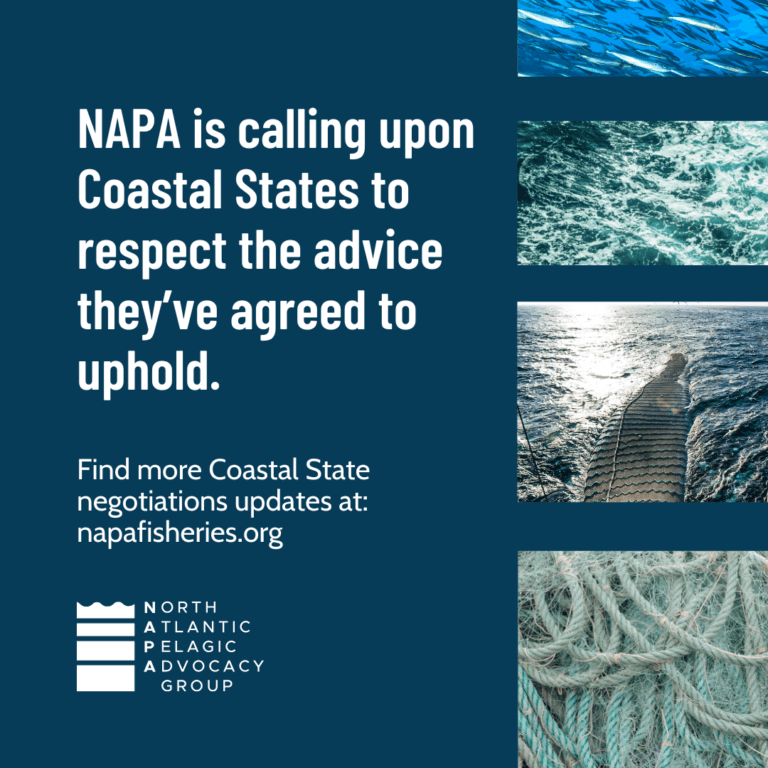The North Atlantic Pelagic Advocacy Group (NAPA) has confirmed a two-year extension to its innovative Fishery Improvement Projects (FIPs), emphasising the urgent need for responsible management of pelagic fisheries, and describing the importance of securing sustainable catch shares as “too critical to walk away from.”
NAPA – the global coalition of over 50 retailers and supply chain businesses committed to sustainable seafood sourcing and production – launched its innovative Fishery Improvement Projects (FIPs) in 2021. Their aim is to drive consensus between fishery managers on some of the most important and politically challenging fisheries in the North East Atlantic: mackerel, blue whiting, and Atlanto-Scandian herring. Originally concluding in 2024, the projects have now been extended to 2026, offering a final opportunity for Coastal States to secure equitable sharing agreements to halt fishing above scientific guidelines and ensure long-term environmental and business security.
Commenting on NAPA’s advocacy to date, Aoife Martin, NAPA Chair, said: “Despite three years of relentless efforts from NAPA, the political deadlock has remained. Coastal States have continued to prioritise their own interests over the sustainable management of these stocks, leading to continued overfishing. This extended two-year timeline to reach a much-needed political solution marks the beginning of the next chapter for NAPA – one that must reinforce the urgency and prioritise the science.”
With a new deadline for the FIPs, NAPA emphasises that it is more determined than ever to leverage the power of the marketplace and encourage Coastal States to find a way forward to collaborate, compromise, and cut the overall catch.
Martin added: “Over the next two years, our coalition will redouble efforts to propose actionable solutions for Coastal States, and we’ll be developing and sharing novel research to support these initiatives. We will intensify the push for comprehensive quota-sharing agreements among the nations involved. The issue is just too critical to walk away from.”
Bolstering this approach into 2026, seafood consultant Dr Rob Blyth-Skyrme, whose career has been built on the development of environmentally and economically sustainable approaches to stock management in fisheries, has joined the NAPA team as Project Lead.
“I firmly believe in NAPA’s mission and the power of collaboration,” said Blyth-Skyrme. “But with a big job ahead of us and a ticking clock, we need to focus on action at the scale and pace required for meaningful impact.
“NAPA is the voice of the global market for pelagic seafood, and our message is loud and clear: we must follow the science. If any of these key stocks were to become overfished, it would be hugely damaging for the credibility of the management process. With Coastal State negotiations happening this week, we urge leaders to recognise that the ONLY solution here is a political one. We have a collective responsibility to protect the environment, ensure long-term business security, and safeguard consumer trust in the fishing industry. It couldn’t be more critical to act now.”
Recent ICES data on the state of the three pelagic stocks1 exacerbate this decline and jeopardise the stocks’ long-term health.
This should come as no surprise to those who have been following the developments on these stocks – including Coastal States. For most of the past decade, the science has been disregarded, and the lack of an effective quota-sharing agreement resulted in the suspension of MSC certification for the three fisheries. Recommended quotas for 2025 indicate a significant need for adjustment from the expected 2024 catches: a 10% reduction for herring, 23% for blue whiting and a massive 40% for mackerel – highlighting how far management has strayed from the science. From 2019-2023, average mackerel catches exceeded the advice by 23%, blue whiting by 30%, and Atlanto-Scandian herring by as much as 34%.
While NAPA recognises this is a complex issue to solve, there have been some signs of progress. In 2024, the UK, Norway, and the Faroe Islands signed a catch-sharing agreement that commits to adhering to specified percentages of the recommended limits. However, this agreement does not include other Coastal States: the EU, Iceland, and Greenland.
Blyth-Skyrme is quick to point out the need for a broader consensus. He says:
“The trilateral agreement shows that progress is possible. However, it is only a stepping stone toward what is really needed: a comprehensive management agreement that includes all Coastal States and adheres to scientific advice. Long-term disputes have exposed these stocks to overfishing for far too long. Our members will persist in advocating for equitable sharing agreements, as failure to achieve these could have significant market repercussions for all stakeholders.”
View the official press release here.

The North Atlantic Pelagic Advocacy Group has been shortlisted for The Sustainability Award in the...
Read More >
Date of issue: 12 October 2023 In an open letter to Ministers, a pioneering collective...
Read More >
Date of issue: 1 October 2024 The North Atlantic Pelagic Advocacy Group (NAPA) is pleased...
Read More >